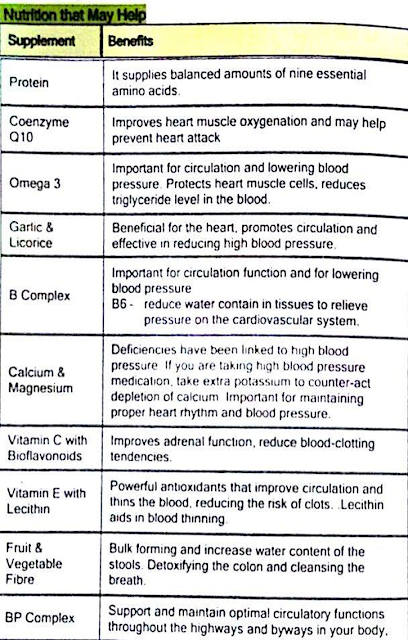Topic:
Part1:
- what is cholesterol?
- what is the target readings of total cholesterol,
HDL and LDL?
- what are the consequences if cholesterol level is
high and how does it happen?
- ways to reduce cholesterol, including supplements.
what are the potential side effects of cholesterol-lowering drugs?
Part2:
With our fast paced life styles, we end up consuming
lots of processed foods/junk food which is high in fats especially Omega-6
fatty acids. This creates an imbalance between Omega-6 fatty acids &
Omega-3 fatty acids leading to disturbance in normal well being. To balance the
same we need to consume optimal amounts of Omega-3 fatty acids, which are also
referred as the "good fats". These must be obtained from diet because
the body cannot manufacture them on its own.
so,
-
What is omega 3?
-
Omega 3 supplement vs natural food
sources (eg salmon, ikan billis, etc)
-
Who
needs Omega 3 the most and how it can help?
-
Tips to choose the best fish oil
-
Part
3:
endorsement by diamond
Answer:
part
1:
Cholesterol is a waxy, fat-like substance that
your body needs to function.
·
It helps make the outer
coating of cells.
·
It makes up the bile
acids that work to digest food in the intestine.
·
It allows the body to
make Vitamin D and hormones, like estrogen in women and testosterone in men.
It has been found that too much of this fat-like
substance cholesterol can build up on the walls of your arteries and form
blockages under certain conditions. This can lead to heart disease, heart
attack and stroke.
There are two kinds of cholesterol:
·
High-density lipoprotein
(HDL) called ‘good cholesterol’.
·
Low-density lipoprotein
(LDL) called ‘bad cholesterol’.
Target
Triglycerides ≤1.7 mmol/L
HDL cholesterol ≥1.1 mmol/L
LDL cholesterol ≤3.4 mmol/L (1-2 risk factors)
≤2.6
mmol/L (more than 2 risk factors)
<1.8mmol/L
(with overt CVD)
Part
2:
Question 1: What
is omega 3?
Omega-3-unsaturated
Omega-3 fatty acids are the building blocks of every living cell in the
human body. They are absolutely necessary for normal
health and development. Without them, cells can’t function, renew, or maintain themselves properly.
The omega-3 fat found in flaxseed, alpha-linolenic acid (ALA), is known as a short-chain omega-3 fat, while
other omega-3 fats like EPA and DHA (I won’t bore you with their scientific names) are
long-chain omega-3 fats.
Omega 3 promote cardiovascular health, support a healthy memory and
learning, help brain and vision development of infants, and promote natural
joint flexibility and mobility.
omega-3 fatty acids from eating fatty fish or supplements, also tend to
have increased HDL cholesterol and decreased triglycerides (fats in the blood).
Symptoms of omega-3 fatty acid deficiency include fatigue, poor memory,
dry skin, heart problems, mood swings or depression, and poor circulation.
Because the body cannot manufacture omega-3
fatty acids, they have to be consumed in foods/supplements.
Question 2: Who
need it the most and how omega 3 can help?
-
Non-vegetarians
who don't eat fish or eat less of fish.
-
Chooses
highly processed foods, smokes, drinks alcohol & skips meals.
-
People
are having or with a pre-disposition toward the following diseases:
High cholesterol
|
-
Several studies have shown that omega-3 fatty acids tend to have increased HDL(good) cholesterol and decreased triglycerides
(fats in the blood)
|
High blood pressure
|
-
An analysis of 17 clinical
studies using fish oil supplements found that taking 3 or more grams of fish
oil daily may reduce blood pressure in people
with untreated hypertension.
|
Heart disease
|
-
Fish oil also appears to help prevent and treat atherosclerosis
(hardening of the arteries) by slowing the
development of plaque and blood clots, which can clog arteries.
-
Clinical evidence suggests that EPA and DHA help reduce risk factors for heart disease, including
high cholesterol and high blood pressure.
|
Diabetes
|
-
People with diabetes often have high
triglyceride and low HDL levels. Omega-3 fatty acids from fish oil can
help lower them
|
Rheumatoid arthritis
|
-
A number of small studies have found that fish oil helps reduce symptoms of RA, including joint pain and
morning stiffness.
|
Osteoporosis
|
-
Some studies suggest that omega-3 fatty acids may help increase levels of calcium in the body and
improve bone strength.
-
In a study of women over 65 with osteoporosis, those who took EPA and
GLA supplements had less bone loss over 3 years than those who took placebo.
Many of these women also experienced an increase in
bone density.
|
Depression,
Bipolar, Disorder
Schizophrenia,
ADHD,
cognitive
decline (dementia, Alzheimer's disease)
|
-
Preliminary clinical evidence suggests that people may have an
improvement in symptoms when given omega-3 fatty acids
-
DHA是构成脑细胞膜的必需成分,也是维护脑部健康的重要功臣。它能使化学讯息顺利地在脑细胞之间传送作有效率的沟通。经常服食Omega-3不仅能增强学习能力、记忆力和专注力,亦能舒解压力及令情绪大为振奋。
-
很多人都以為記性、智力及集中力 是天生的, 日本人一直被譽為聰明的民族, 那為什麼呢? 原來這與他們飲食中攝取足夠含有DH不飽和脂肪酸的魚類有關。經臨床醫學發現, 補充DHA的孩子, 他們的IQ發育指數普遍比其他孩子為高。
|
偏头痛
|
临床研究显示,Omega-3能帮助抑制导致疼痛和发炎的“不良”前列腺素之分泌。它也能减少血液的粘度,以促进脑部的血液循环。这将会减少偏头痛的发作次数,亦能减低其严重程度和待续时间。Omega-3是美国头痛基金会所推荐的营养补给品。
|
Skin disorders
|
Omega-3能令皮肤均衡保湿及保持健康。它能强化围绕于每一个细胞周围的纤柔细胞膜,使细胞获得充足滋养,同时能有效地把细胞内的废物予以排除。它能使真皮层分泌出更强力的胶原和弹性纤维,帮助消除皱纹和细纹,并挺实渐呈松弛的皮肤。因缺乏Omega-3而引致的常见皮肤问题包括皮肤粗糙、密集的污班、脚跟龟裂、湿疹、牛皮癣、粉刺、黑头及白头。
|
Macular Degeneration
|
A questionnaire given to more than 3,000 people over the age of 49
found that those who ate more fish were less likely to have macular
degeneration (a serious age related eye condition
that can progress to blindness) than those who ate less fish.
|
Menstrual pain
|
In one study of 42 women, they had less menstrual pain when they took
fish oil supplements than when they took placebo.
|
Coloncancer
|
Eating foods rich in omega-3 fatty acids seems to reduce the risk of colorectal cancer. For example, Eskimos,
who tend to have a high fat diet, but eat significant amounts of fish rich in
omega-3 fatty acids, have a low rate of colorectal cancer. Animal studies and
laboratory studies have found that omega-3 fatty acids prevent worsening of colon cancer.
|
Prostate cancer
|
Population based studies of groups of men suggest that a low fat diet
including omega-3 fatty acids from fish or fish oil help prevent the development of prostate cancer.
|
Question 3:Tips
to choose the best fish oil:
1. Safety/purity (How do I know the oil in NUTRILITE products is free
from PCBs or other contaminants that might be in the oceans?)
Nutrilite salmon omega 3 is purified by molecular
distillation and this high-tech process removes most of the scary stuffs.
This is why eating a fish oil supplement is much safer than eating whole fish
too.
NUTRILITE scientists voluntarily joined with 23
other international companies, under the guidance of the Council for Responsible Nutrition,to work on
developing standards for ensuring a supply of consistent, high-quality, raw
materials. Applying those standards, we start with high-quality fish oils from ocean fish like anchovy, mackerel, and sardines.
We use a proprietary process to extract the omega 3s
and purify them.Finally, we test the refined oil for purity and stability.
In general, fish that are lower on the food chain like sardines and
anchovies naturally have a lower concentration of contaminants. For this
reason, it may be wise to look for a product made from these fish. Potential
contaminants as below:
Just stay away from Shark
oil and Seal oil, please! Cod liver oil is better than shark’s but Cod are big fish too. And they live for a long time. This
gives them plenty of time and opportunity to bulk up on environmental toxins.
没有添加任何人造香料、防腐剂、合成色素,安全、放心。(Contains
no artificial colors, flavors or preservatives
thus reinforcing the trust and confidence of a high quality product.)
2. Amount of EPA, DHA (not
the total weight/% in the capsule)
- such as "1,200 milligrams fish oil." But this refers to the
amount of the oil itself, not the actual omega-3 content.
3.Quality (source of fish)
●深海魚油、魚肝油、鮫魚油有什麼不同?
答: 深海魚油主要成份為EPA及DHA,主要功能是降血脂;魚肝油是從魚肝萃取出來,主要成份為維他命A及D,有保護眼睛的功能;鮫鯊烯(Squalene)是深海鮫魚油的主要成份,是一種類似EPA的脂肪酸,有抗氧化功能,能增加細胞帶氧量,維持皮膚年輕,白皙。
4.Types of base
Natural
triglyercide oil.
|
Ethyl
ester oil乙基酯
|
|
nature
|
This
is what you get when you “squeeze” the whole fish and extract the natural oil
from it. It is the closest to eating fish oil in its natural
form, and is highly bioavailable.
|
The
ester form is still in a semi-natural state
because it is the result of a process that naturally occurs in the
body.
|
absorption
|
Studies
on absorption of the various types of fish oil suggest that, the natural
triglyceride form is absorbed better
One
study by Lawson & Hughes in 1988 showed that 1 gram of EPA and 0.67 grams
of DHA as natural triglycerides were absorbed 3.4 and
2.7 fold as well as the ethyl ester triglycerides.
|
poorer
|
How to improve absoption
|
Low
fat meal- 69%
High
fat meal- 90%
(In
another study by Lawson & Hughes later the same year, they showed that
the absorption of EPA & DHA from natural triglycerides improved from 69%
with a low-fat meal (8g total fat) to 90% with a high-fat meal (44g total
fat). Absorption of both EPA and DHA from ethyl ester oils was increased
three-fold from 20% with a low-fat meal to 60% with a high fat meal.)
|
Low fat meal: 20%
High fat meal- 60%
Even taken with high fat meal, its absorption is
still poor.
|
Demo
|
|
The observation that the EE form is able to dissolve
Styrofoam simply reflects the fact that the polarity of EE is extremely
similar to Styrofoam.
|
5. Sustainability:
The fish should be harvested in a sustainable manner and species that
are under threat should be avoided.
6.
Select a reputable product.
Question 4: Omega 3 supplement vs natural food sources
It is always a good idea to eat whole foods rich in omega-3 fatty acids,
and ocean fish is the best source. But if you don’t eat
ocean fish at least twice a week, NUTRILITE omega-3 supplements can help
you get the EPA and DHA that might be missing from your diet.
Whilst increasing fish consumption can offer health benefits, there are
concerns associated with fish and shellfish consumption due to contaminants
such as methyl mercury, dioxins and polychlorinated
biphenyls (PCB) – all pollutants from industrial processes. Those fish
that sit higher in the food chain are likely to contain higher levels of
contaminants and some larger fish such as marlin, swordfish and tuna are
becoming increasingly unsafe to eat. High toxin levels in larger, longer living
fish therefore means that we are restricted as to how much we can eat and how
often.
wild-anchoviesFish also contains vitamin A, which is a fat-soluble
vitamin and is stored in the body. High levels of vitamin A are toxic and have
been associated with liver damage. In purified
oils, vitamin A is removed, enabling high quantities of omega-3 to be consumed
without risking vitamin A toxicity. This is particularly important for pregnant
women, as excess intake of vitamin A during pregnancy can cause birth defects.
Purified omega-3 supplements enable us to take
higher doses, safely. A supplement is something that should be
considered in addition to a healthy diet, so when taking an omega-3 fish oil
supplement, this ideally should be on top of consuming small, short-lived oily
fish once or twice a week. For some individuals, two portions of oily fish a
week may give them all they need to maintain good health, but for others with
specific conditions, demands may be somewhat higher, and therefore
supplementing may further support health.

























.jpg)
